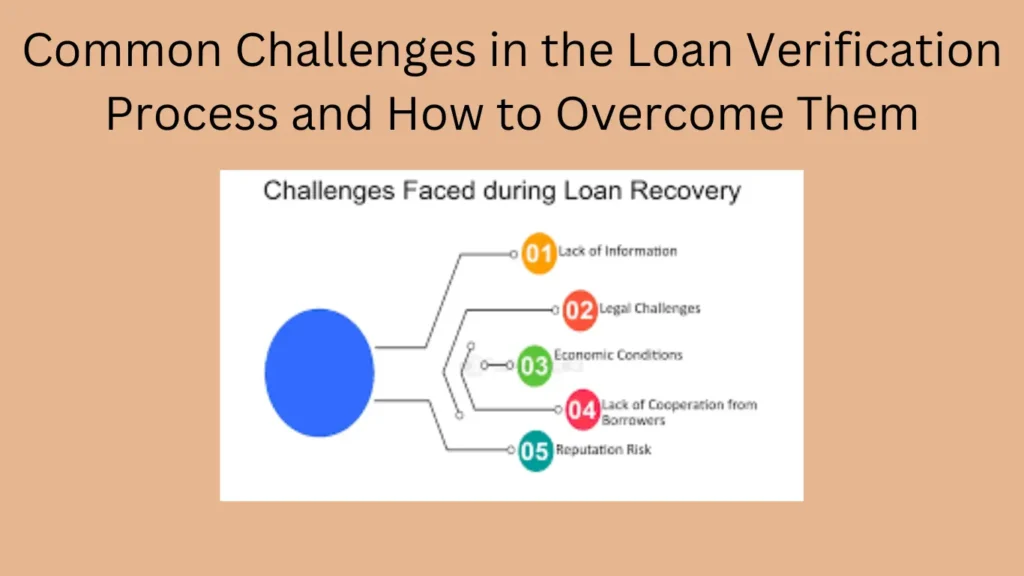Navigating the loan verification process can be challenging, but understanding potential hurdles and knowing how to address them can make the experience smoother. Here are some common challenges faced during the loan verification process and tips on how to overcome them.
1. Incomplete Documentation
Challenge: Incomplete or missing documentation is one of the most common reasons for delays in the loan verification process. Missing proof of identity, income, or address can stall the process.
Solution: Create a checklist of all required documents before starting your loan application. Ensure you have everything ready and organized. Double-check with your lender for any additional documentation that may be needed.
2. Low Credit Score
Challenge: A low credit score can significantly impact your chances of loan approval. Lenders use credit scores to assess your financial reliability.
Solution: Check your credit score before applying for a loan. If it’s low, take steps to improve it by paying off outstanding debts, reducing credit card balances, and ensuring timely payments on all bills. Consider seeking advice from a financial advisor if needed.
3. Inconsistent Information
Challenge: Providing inconsistent information, such as discrepancies in your employment details, income, or address, can lead to delays or rejection of your loan application.
Solution: Ensure all the information you provide is accurate and consistent across all documents. Double-check your application form and supporting documents for any discrepancies before submission.
4. Employment Instability
Challenge: Frequent job changes or gaps in employment can raise red flags for lenders, indicating potential instability in your financial situation.
Solution: If possible, maintain a stable job for at least a few months before applying for a loan. If you’ve recently changed jobs, provide additional documentation to explain the transition and show that your new position is secure.
5. High Debt-to-Income Ratio
Challenge: A high debt-to-income (DTI) ratio can indicate to lenders that you may have difficulty managing additional debt, which can hinder loan approval.
Solution: Calculate your DTI ratio before applying for a loan. Aim to reduce your debt by paying off outstanding balances and avoid taking on new debt. Increasing your income can also help improve your DTI ratio.
6. Insufficient Bank Statements
Challenge: Lenders typically require several months of bank statements to verify your financial stability. Incomplete or insufficient bank statements can delay the verification process.
Solution: Ensure you have complete bank statements for the required period, usually the last 6-12 months. Avoid making large, unexplained transactions during this time, as they can raise questions from the lender.
7. Delayed Responses to Lender Requests
Challenge: Not responding promptly to lender requests for additional information or documents can lead to unnecessary delays in the loan verification process.
Solution: Stay proactive and responsive throughout the loan application process. Keep track of any communications from your lender and provide the requested information as quickly as possible.
8. Unresolved Discrepancies
Challenge: Discrepancies in your credit report, such as errors or outdated information, can negatively affect your loan application.
Solution: Review your credit report regularly and dispute any errors you find with the credit bureau. Ensuring your credit report is accurate and up-to-date can improve your chances of loan approval.
9. Choosing the Wrong Lender
Challenge: Not all lenders have the same criteria or processes for loan verification. Choosing a lender whose requirements don’t match your financial profile can lead to rejection or delays.
Solution: Research and compare different lenders to find one that best fits your financial situation and needs. Look for lenders with a reputation for efficient processing and good customer service.
10. Lack of Professional Guidance
Challenge: Navigating the loan verification process without adequate knowledge or guidance can be overwhelming and lead to mistakes.
Solution: Seek advice from financial advisors or loan consultants who can provide expert guidance and help you avoid common pitfalls. Their expertise can make the process more manageable and increase your chances of success.
For further Inquires Contact Us
FAQs
What should I do if I have incomplete documentation?
Ensure you have a checklist of all required documents and double-check with your lender to ensure everything is complete before submission.
How can I improve my credit score before applying for a loan?
Pay off outstanding debts, reduce credit card balances, and ensure timely payments on all bills. Consider consulting a financial advisor for additional strategies.
What if there are discrepancies in my loan application?
Double-check your application and supporting documents for accuracy and consistency. Correct any discrepancies before submission to avoid delays or rejection.
How can I manage a high debt-to-income ratio?
Reduce your debt by paying off outstanding balances and avoid taking on new debt. Increasing your income can also help improve your debt-to-income ratio.
What should I do if my employment history is unstable?
If you’ve recently changed jobs, provide documentation explaining the transition and demonstrating job security in your new position. Stability can improve your chances of approval.
